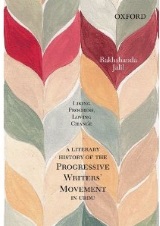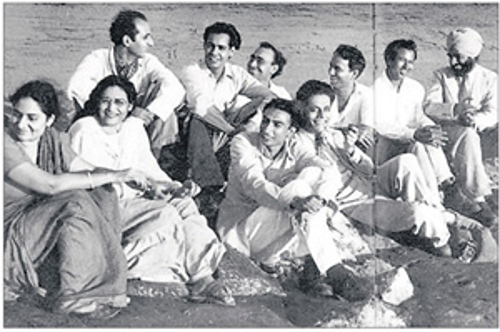Liking Progress, Loving Change: A Literary History of the Progressive Writers’ Movement in Urdu

Hardback: 512 pages
|
The Progressive Writers’ Movement (PWM) was the brainchild of a handful of scions from upper-class Indian families studying in England in the late 1920s and early 1930s. There, they imbibed the spirit of “liberté, egalité, fraternité” that had permeated Europe since the French Revolution and were also exposed to socialist ideology. Together, these two strands of thought gelled for them into an acute awareness of the situation back home — an India groaning under not just British colonial rule but also under its own trenchant practice of social inequality, which left the greater swathe of the population disenfranchised, and its own centuries-old religious obscurantism.
Fired by revolutionary zeal, they drew up a manifesto (which was to undergo changes during PWM’s roughly 25-year life, in tandem with developments in the Soviet ideology percolating through the Communist Party of India (CPI)). The fiery young men returned home determined to right all the wrongs, mainly through the production of socially aware literature that focused on what the philosopher Edmund Husserl calls die Lebenswelt (the “concrete world of life”). A collection of nine short stories and a play appeared under the title Angaarey (Embers) in 1932 and was promptly banned by the British colonial government to placate the Muslim population whose spokespersons had stood up in arms against what they perceived to be the collection’s highly objectionable contents. The authors of the doomed collection were Sajjad Zaheer, Ahmed Ali, Mahmuduzzafar (three of the signatories to the manifesto) and Rashid Jahan, a doctor by profession and the sole woman writer of the quartet. Four years later, on April 9, 1936, they launched the All-India Progressive Writers’ Association (AIPWA) during a conference at Lucknow, which was presided over by Munshi Premchand and blessed by major nationalist figures, including Jawaharlal Nehru. This amazing work of exhaustive scholarship by Rakhshanda Jalil tells the story of this movement, its dictatorial chokehold over literary production, its considerable achievements and its ultimate failure.  (From left) Progressive Movement writers Sultana Jafri, Ismat Chughtai, Vishwamittra Aadil, Ali Sardar Jafri, Krishan Chander, Mahendranath, Mumtaz Hussain, Rajinder Singh Bedi and (in the front) Sahir Ludhianvi and Habib Tanvir in 1946. Unlike most Urdu works on the PWM, however, her study does not begin with the two seminal dates of 1932 and 1936. It begins with antecedents that go back to the Revolt of 1857. This is for two reasons: (1) to dispel the notion that the PWM was the inventor of “progressivism” in literature — a fluid term since traces of progressive ideas are easily found even in pre-modern times (although the term had acquired a sense of urgency for Indian Muslims since the Revolt: how to chart the future course of their political life in the wake of their defeat); and hence (2) to show that Muslims were the main actors in the movement which, though literary, was inevitably implicated in politics. Then again, mostly Urdu writers filled the AIPWA’s ranks and the output in Urdu was quantitatively more voluminous than any other Indian language. Inasmuch as the majority of Urdu writers were Muslim, this is also a study of Muslim politics since the upheaval of 1857 as a determinant of two diametrically opposite views of progress. The AIPWA met with tremendous success among the greater part of the Indian intelligentsia, who found little to disagree with in its manifesto. Disagreement arose — and soon enough — when the close association of some of its leaders with the CPI and their slavish adherence to Soviet diktats, even in matters of literature, began to weigh heavily on the creative freedom of not just the general membership but even of one of its founding fathers, Ahmed Ali, and of some of the major writers associated with it (e.g., Rajinder Singh Bedi and Ismat Chughtai). The cry for socially engaged literature was one thing, production of literature without regard to its inherent autonomy and self-sufficiency quite another. Then, too, the fickle leadership of the PWM kept changing its position all the time: for instance, sexual themes, which were admitted at first but tabooed later. This happened quite often with the stories of Chugtai and of Saadat Hasan Manto, who was embraced, then ousted, and then admitted again later into the Progressives’ ranks. In the third and fourth decades of the 20th century, the PWM had become a formidable literary organisation, indeed so much that many writers who believed in literature’s autonomy found the literary horizon shrinking. Literary magazines, themselves under the tight control of the PWM, would not publish their work. Nevertheless, some writers (Ahmed Ali, Chugtai, Manto, Bedi, Azizi Ahmad), who could not submit themselves to the rigid, doctrinaire view of literature espoused by the Progressive leadership, valiantly held the fort to preserve their freedom of choice in literary subject and treatment. By the mid-1940s, the PWM had lost much of its appeal for the writer, partly owing to the post-Independence policies of the Congress Party and the CPI, and partly as a result of the growing disenchantment of the erstwhile progressive writers. Ten years later, the PWM was a spent force on the literary horizon of both India and Pakistan, where it had a very short lifespan. Its failure and the generally poor quality of the work produced under its aegis aside, it was not devoid of a significant achievement: at the very least it speeded up Urdu’s break from its former cloying romanticism and launched it into the bright landscape of a more socially aware writing that focused on the here and now of the masses — a process already set in motion by Premchand and brought to fruition during the glory days of the PWM. In a single, albeit massive, volume of thoroughly researched text with copious annotation, plus very useful appendices (biographies of major writers and poets associated with the PWM; important dates; major progressive literature in Urdu; two versions of the manifesto and later amendments), Jalil has produced a comprehensive — indeed a definitive — history unlikely to be replaced by another work any time soon. |
